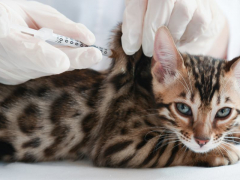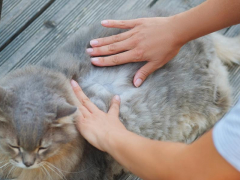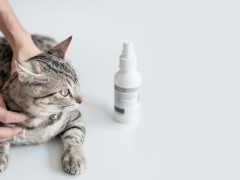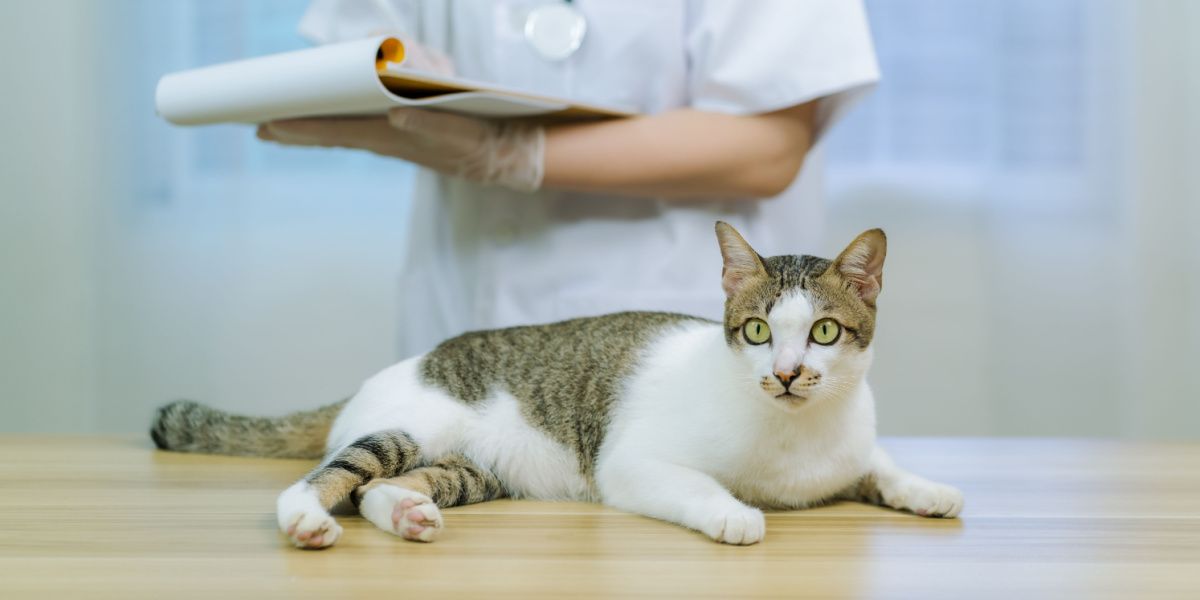
Ivermectin is a prescription-only drug used to treat parasites in cats and other animals. You are most likely to use ivermectin in your cat to prevent heartworm infection, using a monthly tablet (Heartgard). But your veterinarian might also prescribe ivermectin for a variety of other parasites, including ear mites and scabies.
Ivermectin comes in tablet, liquid (for use in the ear), and injectable forms. Ivermectin is quite safe for cats when used at recommended doses but can have serious side effects at high doses.
Ivermectin for Cats Overview

About Ivermectin for Cats
Ivermectin is most commonly used in cats to prevent heartworm infection. Heartworm is a serious disease caused by worms called Dirofilaria immitis. Your cat can be infected after being bitten by an infected mosquito. Heartworm infection can cause coughing, breathing problems, and non-specific signs such as weight loss or vomiting. Sadly, in severe cases, it can cause sudden death.
Heartworm infection is difficult to treat, so it is better to prevent your cat from being infected. To prevent heartworm, you can give your cat an ivermectin tablet (Heartgard) at home every month.
Ivermectin can also be used to treat other internal and external parasites in cats, such as ear mites and scabies. It is not effective against fleas or tapeworms.
Ivermectin Dose for Cats
Ivermectin is approved by the FDA in cats for preventing heartworm, using Heartgard tablets. They recommend a minimum dose of 12 micrograms/pound once a month. However, you should speak to your veterinarian about testing your cat for active heartworm infection before starting preventative treatment.
| Cat Weight | Tablets per month | Strength |
| Up to 5 pounds | 1 | 55 micrograms |
| 5 to 15 pounds | 1 | 165 micrograms |
The FDA has also approved an ivermectin solution for treating ear mites in cats, called Acarexx otic suspension.
Heartgard Oral Tablets
Heartgard tablets are the licensed product for preventing heartworm in cats older than 6 weeks old. They come in two tablet sizes: 55 micrograms (for cats up to 5 pounds) and 165 micrograms (for cats 5 to 15 pounds). Give your cat one tablet a month year round.
You must give the first dose within 30 days of your cat’s first possible exposure to mosquitoes. The last dose should be given no later than 30 days after their last possible exposure. Try to give Heartgard on the same day each month to make sure they are effective.
Monthly treatment with Heartgard will also protect your cat against infection with hookworm.
Acarexx Otic Suspension
Acarexx otic suspension contains 0.01% ivermectin and is used to treat adult ear mites in cats and kittens older than 4 weeks of age. Your vet will administer 0.5 milliliters of liquid into your cat’s ear canal. Usually, one dose is effective. But your vet might repeat the treatment once more if needed.
Off-Label Use of Ivermectin
Your vet may also use ivermectin “off-label” at differing doses and formulations to treat other parasites in your cat, such as scabies. This means they are using it in a way that is not what the FDA originally approved it for. For example, your veterinarian might use an injection of ivermectin that is licensed in farm animals to treat ear mites or scabies in your cat.
How To Administer Ivermectin to Cats
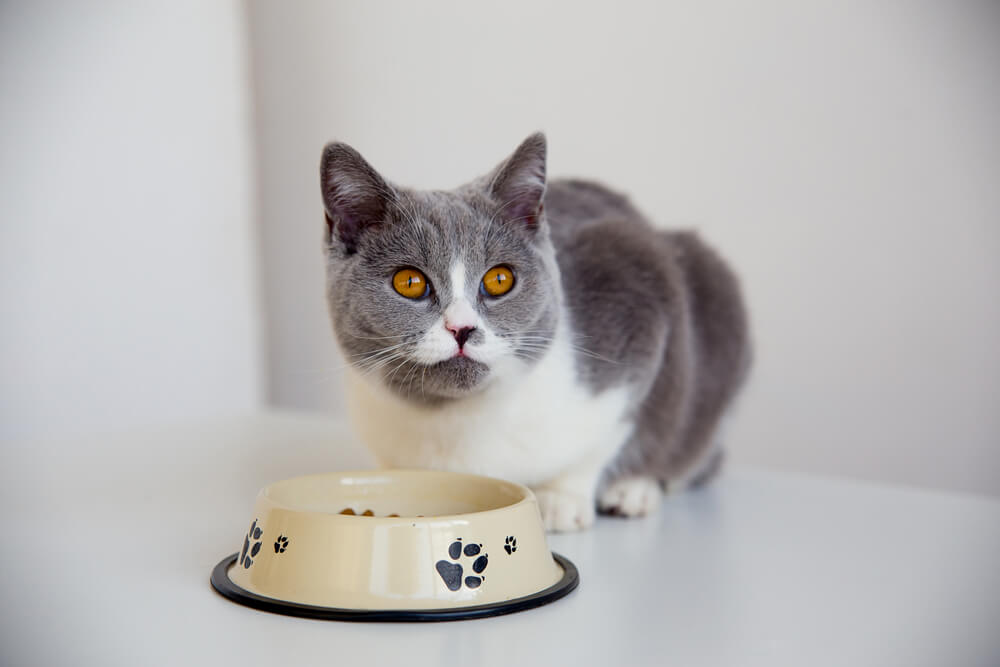
Heartgard (ivermectin) comes as a chewable tablet that can be given to your cat as a treat or mixed into food.
If you are administering ivermectin to your cat at home, this will most likely be Heartgard tablets. As Heartgard tablets are chewable, you can offer the tablet to your cat in your hand or mixed with a small amount of their food.
However, if your cat will not eat the tablet, you can break it into pieces and give it directly into their mouth. Take care to ensure your cat has eaten the whole tablet. If you think they haven’t, it is best to give them a new one.
Side Effects of Ivermectin for Cats
When used at appropriate doses, ivermectin is very safe for cats. There is a small chance your cat might experience vomiting or diarrhea. However, in clinical trials, this was only seen in less than 0.3% and less than 0.2% of cats respectively.
If you think your cat does experience a side effect from ivermectin, contact your veterinarian for advice. You should also report the suspected reaction to the manufacturer, Boehringer Ingelheim Animal Health USA.
Overdose and Emergencies
Ivermectin has a wide safety margin in cats, meaning overdoses with heartworm prevention tablets are rare. Of course, if your cat does ingest more than the recommended amount you should contact your veterinarian for advice.
However, ivermectin is often used off-label in cats using formulations designed for much larger animals such as cattle, sheep, and horses. Unfortunately, it is not uncommon that cats are overdosed when these products are used at an inappropriate dose, as they contain such high concentrations. Cats can also suffer from ivermectin overdose by accidentally ingesting these large animal formulations. For instance, licking unused horse wormer from the syringe.
If your cat ingests an overdose of ivermectin they might show signs within two to three hours. But symptoms can also develop more slowly in less serious cases. Symptoms of ivermectin toxicosis include:
- Depression
- Weakness
- Enlarged pupils
- Blindness
- Lack of coordination (ataxia)
- Collapse
- Tremors
- Seizures
- Coma
Cats suffering from ivermectin toxicosis need immediate and intensive veterinary treatment.
Potential Drug Interactions With Ivermectin
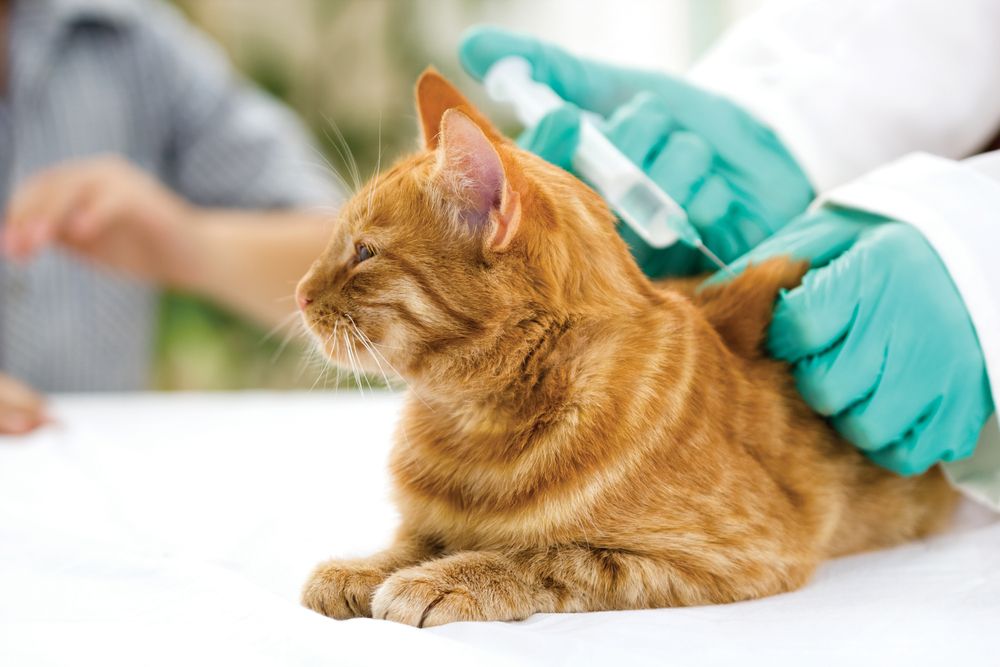
Cats should not use ivermectin if they are also taking benzodiazepines, ketamine, erythromycin, spinosad, or certain anti-fungal treatments.
Ivermectin is used safely in cats receiving common vaccinations, antibiotics, steroids, and other antiparasitics. However, it is important to let your veterinarian know about any treatment (including herbal or nutritional supplements) that your cat is taking before they prescribe ivermectin.
In particular, avoid using ivermectin in your cat if they are being treated with benzodiazepines, ketamine, erythromycin, spinosad, or certain anti-fungal treatments.
How To Store Ivermectin
Store ivermectin products at room temperature away from direct sunlight. Always return the remaining tablets in their blister-backed foil into the package after use to protect them from light.
Drug Dosing Disclaimer: We are only able to provide doses for medications that are FDA approved for use in cats and only as the label guidelines dictate. For medications that are used off-label we can only provide guidelines and safety information for use. Safe and appropriate dosing for off-label medications can only be determined by a primary care veterinarian.
We encourage you to work with your veterinarian to determine if a particular medication is appropriate for your cat. Changing or adjusting a dose for your cat on your own without consulting with a veterinarian can carry risk. We do not encourage use of medications prescribed for human use in pets without first consulting with a primary care veterinarian.
Related Conditions
- Heartworm Disease In Cats: Causes, Symptoms, and Treatment
- How To Give Your Cat A Pill (With 7 Proven Tips!)
-
Heartgard prescribing information: https://docs.boehringer-ingelheim.com/PI/Paras/Heartgard_for_Cats_PI_with_BI_logo_-2020.pdf
